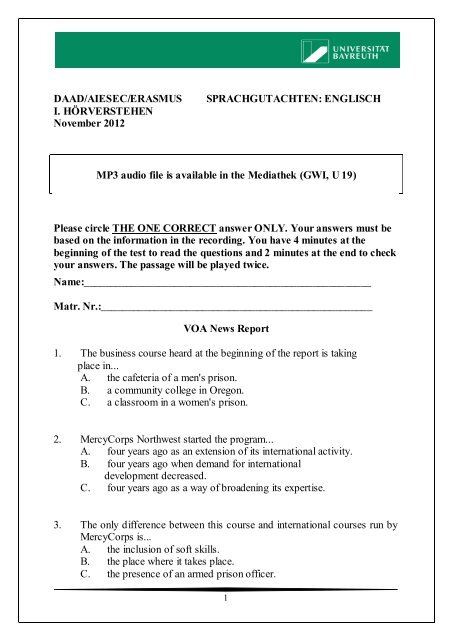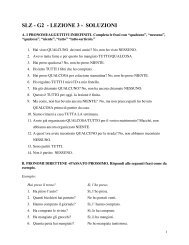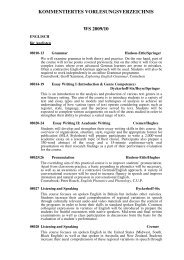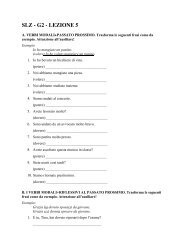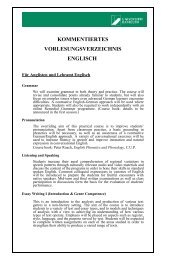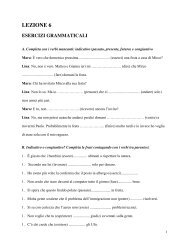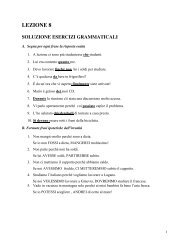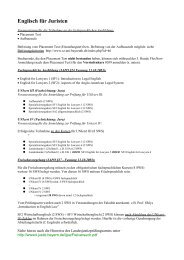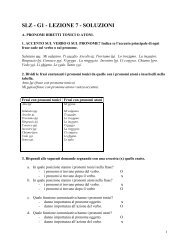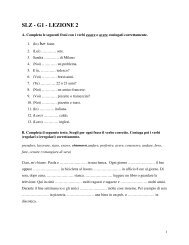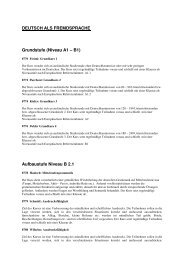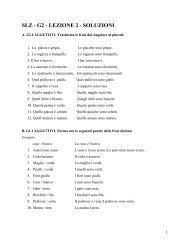DAAD/AIESEC/ERASMUS SPRACHGUTACHTEN: ENGLISCH I ...
DAAD/AIESEC/ERASMUS SPRACHGUTACHTEN: ENGLISCH I ...
DAAD/AIESEC/ERASMUS SPRACHGUTACHTEN: ENGLISCH I ...
Create successful ePaper yourself
Turn your PDF publications into a flip-book with our unique Google optimized e-Paper software.
4. Student Saresa Whitley...A. is due for release this year.B. has a job waiting for her on her release.C. hopes the course will increase her chances of finding a job.5. Which of the following is NOT mentioned by Saresa Whitley as beingsomething she has learnt in the course?A. Setting realistic goals.B. How to write a business plan.C. The meaning of the word "viable".6. Student Cynthia Thompson believes that LIFE aims to...A. give her a new identity.B. prepare people to start successful small businesses.C. be a good business program and also produce good citizens.7. The recidivism rate for LIFE graduates is...A. over fifty percent.B. officially estimated at approximately three percent.C. unofficially given as approximately three percent.8. Now that she has set up her own auto repair shop, Lori...A. thinks her business remains vulnerable due to her past.B. works harder and faster than her competitors.C. views her future with serenity.9. What works, what doesn't? Is it worth having a website of your own?What avenues of advertising can you exploit for free? These are thequestions that Lori...A. thinks that the LIFE course should have covered.B. raised with teachers during the LIFE course.C. has asked her LIFE mentor since graduation.10. Having just set up a new LIFE program, Doug Cooper hopes that the ideaspreads...A. so that MercyCorps can help entrepreneurs in the community.B. so that prisons really become "correctional facilities".C. and that states give tax breaks for this type of activity.2
Solution:1. The business course heard at the beginning of the report is takingplace in...A. the cafeteria of a men's prison.B. a community college in Oregon.C. a classroom in a women's prison.2. MercyCorps Northwest started the program...A. four years ago as an extension of its international activity.B. four years ago when demand for internationaldevelopment decreased.C. four years ago as a way of broadening its expertise.3. The only difference between this course and international courses run byMercyCorps is...A. the inclusion of soft skills.B. the place where it takes place.C. the presence of an armed prison officer.4. Student Saresa Whitley...A. is due for release this year.B. has a job waiting for her on her release.C. hopes the course will increase her chances of finding a job.5. Which of the following is NOT mentioned by Saresa Whitley as beingsomething she has learnt in the course?A. Setting realistic goals.B. How to write a business plan.C. The meaning of the word "viable".6. Student Cynthia Thompson believes that LIFE aims to...A. give her a new identity.B. prepare people to start successful small businesses.C. be a good business program and also produce good citizens.3
II. SCHRIFTLICHE PRÜFUNGJune 2012SPRACHENZENTRUM<strong>SPRACHGUTACHTEN</strong> (<strong>ENGLISCH</strong>)Name:Matrikelnummer:I. Text ComprehensionRead the following article and answer the questions below:Britons still happy despite financial woes, survey findsRandeep Ramesh01.12.2011 © Guardian News & Media 2011Most Britons report being satisfied with life, with concerns over work and precarious financesoutweighed by happiness gained from children, relationships and where people live, accordingto a survey by the Office for National Statistics (ONS). Released days after economists forecastthat the recession would be deep, long and leave the public in 2015 worse off than they were in2002, the government survey paints a picture of the country largely untouched in an emotionalsense by the looming crisis.The survey of 4,200 adults, conducted between April and August 2011, is part of Prime MinisterDavid Cameron’s £2 million drive to get a better measure of how the country is doing rather thanjust focusing on GDP. The ONS’s work showed that on average people rate d their lifesatisfaction at 7.4 out of ten. When asked whether things they did in life were worthwhile, peopleon average gave a score of 7.6.However, there were signs of stress seeping through British society. Satisfaction withrespondents’ financial situation had the lowest mean score of 6.2 out of ten, followed by worksituation, with 6.7 out of ten. When asked specifically about satisfaction with the balancebetween time spent on paid work and on other aspects of life, low scores were also given, wit han average of 6.4 out of ten.5
People were most satisfied with their personal relationships and mental well -being, which hadthe highest mean scores – both scored at 8.3 out of ten. Also of concern to policymakers will bethe answer given to the question “Overall, how anxious did you feel yesterday?” More th an aquarter rated this five out of ten, where ten was feeling “completely anxious”.Lord Layard, the LSE Economics Professor, said it was likely that life satisfaction would fall asthe recession hit. “We know from other European countries that this is sensitive to businesscycles and in recessions life satisfaction drops.” Layard, who founded the Action for Happinessmovement to promote well-being, said policymakers could use the data to ameliorate the pain ofrecession. But they would first need to identify how to measure happiness, then work out whatmakes people “miserable or happy” and lastly quantify how much happiness one can create byspending taxpayers’ cash. “That can be on supporting chil dcare, parenting or help for mentalhealth”.Layard argued against expending too much political energy on reducing inequalities. “Although Ibelieve that one pound to a poor person means more than to a rich person and more equalsocieties are happier, I don’t think redistribution of income is by any means the thing that willproduce a happier populace.”The science of well-being has become fashionable, with the Himalayan Buddhist kingdom ofBhutan cited by Cameron as pioneering the idea of “gross national happiness” and France’sPresident Sarkozy asking the Nobel laureates Joe Stiglitz and Amartya Sen how to measure it.In fact, happiness has a long academic heritage – beginning in Western thought with the Greekphilosopher Aristotle. “Aristotle … said there was more to life than how we feel, than justpleasure and pain. It was about how we develop our potential and work with our communities,”Felicia Huppert at Cambridge University’s Centre of Well-being said, pointing out the ONSquestion was asking about the “things in life that were worthwhile”.Huppert said that “probably the most important work recently was that of Jonathan Haidt(Professor of Psychology at the University of Virginia) who looked at a moral theory and talkedabout the importance of relationships.” Haidt identified five values in societies – care, fairness,loyalty, respect and purity – and suggested US liberals privileged the first two over the lastthree. Huppert, Professor of Psychology, said: “A lot of young people think that wealth andcelebrity will make you happy. In fact, the data shows it is about relationships and engagementand feeling that you contribute.”Paul Allen of the ONS said another big factor in happiness was health. “We see that peopleresponded that when their health was bad they would report anxiety. What we are trying to buildup is a picture of how people rate happiness.”One of the most revealing aspects of the emerging science around happiness is aboutlanguage. Britons associated happiness with being “calm, relaxed and peaceful” rather than“energized and excited”. Allen said this could be seen in the placards held up by strikers onrecent demonstrations. “They held up signs saying: ‘We are not happy about this.’ It was veryBritish.”6
Comprehension Questions(50% of the written examination grade)Please circle ONE answer ONLY. Select the BEST answer. Your answers mustbe based on the information in the text.1. The author of the text reports 'signs of stress seeping through British society' because:a) economists have forecast that the recession will be deep and long.b) people have been affected in an emotional sense by the looming crisis.c) people indicated a comparatively low level of satisfaction to both work-relatedand financial matters.d) people worry more now than they did in 2002, even though these concerns areunfounded.2. Research carried out before the ONS survey has shown that:a) in Europe life expectancy is linked to business cycles.b) in Britain life satisfaction declines in times of economic downturn.c) during an economic slump people are less content with their life.d) in times of economic decline people tend to place more emphasis on personalrelationships and family.3. According to Layard:a) the information from the study will not help to reduce the effects of therecession without further research.b) policymakers need to invest in childcare, parenting and mental health.c) the information from the survey shows how hard the recession will hit thepopulation.d) it will be necessary to see exactly how pleased people will be about the factthat they are receiving back some of their hard-earned money.4. Which of the following statements is NOT true?a) Layard does not recommend a strategy which would focus on closing the gapbetween the social classes.b) Layard is of the opinion that taking from the rich and giving to the poor won’tincrease overall life satisfaction.c) According to Layard, to be happy, a society must be equal.d) Layard acknowledges that even a small increase in income makes a significantdifference to the poor.7
5. Happiness/Well-being:a) has recently established itself as a political concept.b) has always been important for politicians, dating back to Aristotle.c) comes about as the result of hard work.d) is impossible to measure.6. Jonathan Haidt’s work shows that:a) wealthy US liberals consider care and fairness to be the most important valuesin society.b) wealthy US liberals consider care and fairness to be the only important valuesin society.c) US liberals do not appreciate the importance of relationships and engagement.d) care and fairness are regarded by US liberals as the key values in society.7. According to Paul Allen:a) being happy is good for your health.b) an increase in anxiety is often the result of bad health.c) if people are in bad health and feeling anxious, they are likely to inform theauthorities.d) when people are anxious, their health declines.8. In the final paragraph it is stated that:a) in Britain workers are willing to go on strike to demand calmer workingconditions.b) there is a lot of talk about happiness in Britain, but very little action.c) the British have a very relaxed approach to happiness.d) the British perception of happiness is linked to feelings of tranquillity andserenity.8
6. Jonathan Haidt’s work shows that:a) wealthy US liberals consider care and fairness to be the most important valuesin society.b) wealthy US liberals consider care and fairness to be the only important valuesin society.c) US liberals do not appreciate the importance of relationships and engagement.d) care and fairness are regarded by US liberals as the key values in society.7. According to Paul Allen:a) being happy is good for your health.b) an increase in anxiety is often the result of bad health.c) if people are in bad health and feeling anxious, they are likely to inform theauthorities.d) when people are anxious, their health declines.8. In the final paragraph it is stated that:a) in Britain workers are willing to go on strike to demand calmer workingconditions.b) there is a lot of talk about happiness in Britain, but very little action.c) the British have a very relaxed approach to happiness.d) the British perception of happiness is linked to feelings of tranquillity andserenity.Number of correct answers Certificate score8 A5-7 B3-4 C2 D1 E0 F10
III. Essay Question(50% of the written examination grade)Please answer the question in YOUR OWN words. Maximum 250 words.“The Germans are still unhappy despite financial well-being.”Do you agree or disagree with this statement? Support your arguments with specificreasons, details and examples.IV. Oral ExaminationPLEASE REMEMBER TO SIGN UP FOR THE 10-MINUTE ORALEXAMINATION!11


